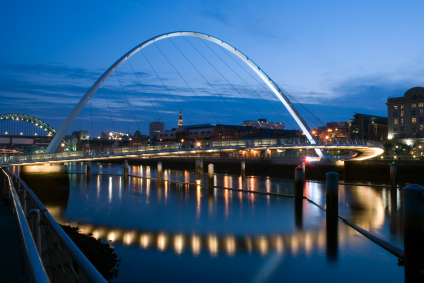
The city of Newcastle upon Tyne is one of the largest metropolitan areas in the north of England. The city has played an important role as a trading port for over 200 years, and undoubtedly this has contributed to turning Newcastle into a populous metropolis with a thriving industrial and economic scene. Over the decades, Newcastle´s face has been transformed due to demographic and economic changes that in a way, are common to those experienced by other English cities. In this article we review the latest demographic, economic, and industrial trends that have recently taken place in Newcastle.
An overview of Newcastle´s demographic makeup
Newcastle´s population experienced a large increase from the mid-1800s onwards. This was mostly due to the economic boom brought about by the industrialisation of Newcastle´s export and trade operations. According to historical records, in 1801 the city only had 33,000 inhabitants. By 1850, the city´s population had more than doubled, standing at 80,000. The increase was even more spectacular during the following fifty years, as in 1900 the city´s inhabitants totalled 246,000. From then onwards, Newcastle´s population kept growing, peaking during the 1950s, when the city reached a population mark of 340,000. After this point, and much in line with the demographic trends that took place in other English cities, the local population experienced a decrease, motivated by economic difficulties and rising unemployment levels. This situation forced many locals to move elsewhere. Between the 1960s and the late 1990s the population decreased substantially, reaching a figure similar to that of the early 1900s. Today, Newcastle´s population is estimated at 292,000. Newcastle is part of the Tyneside conurbation, which having a population of nearly 800,000 is England´s seventh most populous urban area.
According to reports published by the Office for National Statistics, the rise in population numbers experienced over the past decade in Newcastle is mostly due to migration. Although internal migration is still occurring, this is somehow offset by the number of incoming migrants from other countries, mostly from Eastern Europe. In 2008, the number of people moving into the city exceeded the number of those leaving by nearly 4,000 a year.
The largest population group is that of people aged between 20 and 24, as it makes up 15.9 per cent of the total population. This is mostly due to Newcastle´s status as a student city. In terms of ethnicity, Newcastle´s population is predominantly white, although 7.6 per cent of the population is Asian.
Key economic trends in Newcastle
Along with Manchester and other cities in the north of England, Newcastle´s growth was mainly spurred by the city´s role during the Industrial Revolution. Mined coal from surrounding areas was manufactured into a variety of products in Newcastle´s factories. However, heavy manufacturing has lost its importance and nowadays the city has managed to turn around its economic base. In just over a century, the city has gone from being a heavily polluted industrial centre to becoming of the most praised cities in terms of its environmentally-friendly practices.
Nowadays, Newcastle´s economy contributes more than £14 billion to the country´s total GVA. Economic analysts affirm that the city´s economic strategy and the resulting revenues are catching up with those typical from other cities in the south of England. Recent initiatives have contributed to this, such as the development of the NE1 Business Development District.
Industry trends in Newcastle
The most important sectors for Newcastle´s industrial base are business services, retail, and education. As of 2010, there were more than 13,000 companies operating in the city. Over the past few years, several large shopping areas have been created in the city, turning Newcastle into the UK´s top ten cities in terms of retail expenditure. The city´s high footfall has been recently attracting large multinationals such as Bang & Olufsen, Maserati, as well as high end and luxury brands in hospitality (Indigo Hotels, Sandman Signature) and retail (Love Niche and Armani Exchange).
Other important industries in the city are finance, engineering, and construction. The financial sector alone accounts for 22 per cent of all the jobs in the city, thanks to the presence of large institutions like Barclays, Eversheds, and Ward Hadaway. Research and development is also a growing industry, particularly in sectors like pharmaceuticals, medicine, information technology, and sustainable development.
Some of the most important employers in Newcastle upon Tyne are Newcastle University, AA Insurance Services, the Newcastle Building Society, Siemens, Sage Group, Convergys, and companies in the public sector, such as Newcastle City Council and the Newcastle General and Royal Infirmary.
Although the importance of manufacturing has declined substantially, this industry still accounts for 6 per cent of the city´s industrial base. Key employers in this sector are Rolls Royce, BAE Systems, Vickers Defence Systems, and Chieftan.

